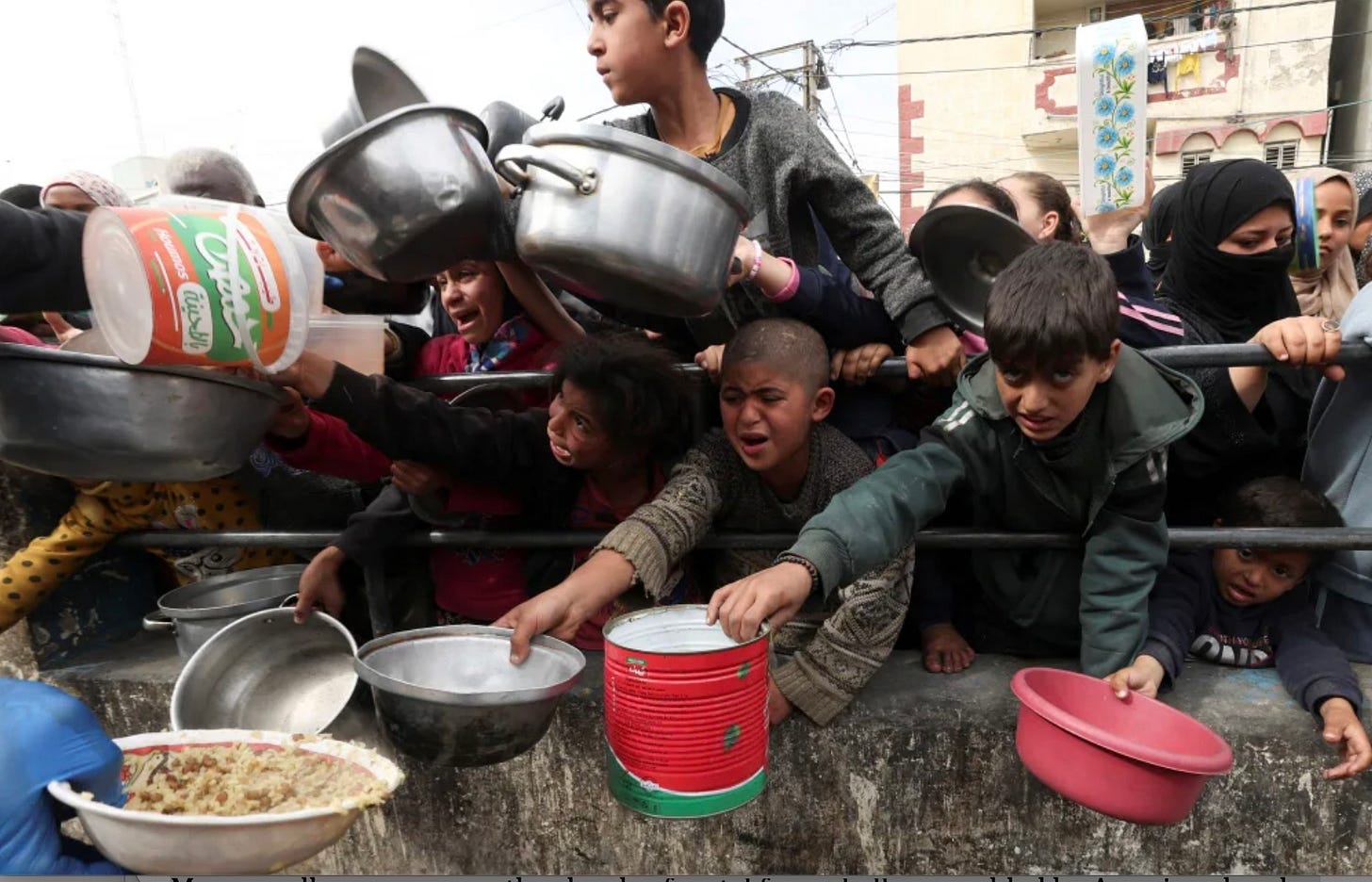American Exceptionalism
It is hard - no, impossible - to reconcile the brilliant spring day outside my Colorado window with the brutal images from Gaza and from our southern border.
We privileged Americans can escape the pain with a quick click of a remote control. We can, but should we?
I well imagine that many others experience this conflict: Images of starving children straining against a wire fence, grasping small tin dishes, begging for food we would not even consider eating; body bags the size of carry-on luggage dragged through crushed remnants of what may have been homes (the total devastation makes it hard to know); school-aged children fearfully clinging to mothers’ hands as they attempt to cross a cruelly unwelcoming border. Is sanity possible if one imagines each of these children as his own?
I confess that I can’t do it. I can’t allow the faces and tender realities of my own grandchildren to be superimposed on this abject horror. Yet what grace or chance has my grandchildren playing in the early spring sun, while the grandchildren of others are hollow-eyed, famished and exhausted beyond feeling?
This is not new, but it seems different now. Starving children and victims of terrifying violence have always been an uncomfortable backdrop to our busy lives and good fortune. But these images, more directly than any in my memory, are drawn by our own intentions - or inattentions. The famished children coated in rubble-dust are there as a direct result of war crimes in which we are complicit through our provision of deadly weapons to Israel. Many small corpses carry the shards of metal from shells assembled by American hands. We supply about 70% of the death devices used by the Israeli military.
“Policies” at the southern border are chaotic at best. While so-called liberals are somewhat more circumspect, Republicans, including the felonious sociopath at their point, are not merely cruel by neglect. They are cruel by disgusting intent, sometimes calling desperate human “animals,” but always treating them as such.
For the most part we avoid thinking about our complicity in these and other atrocities. Some degree of denial is understandable. Shame and guilt are not helpful, unless they spur action, and direct action is beyond the reach of most of us. We can (and should) protest, vote, and contribute to organizations that can and do act. But we individuals are feeble in the face of catastrophe at this scale.
Despite this contemporary evidence, we hold firm to the unexamined boast that we are “good people.” Most of us soothe our minor qualms with a donation here and there, a yellow ribbon on a tree, or our signature on a feel-good petition that will be read only by its signatories. But on a national or international scale are we “good people?” I think not.
The relentless and pointless retaliation in Gaza has no purpose other than to inflict exponentially more pain in return for the relatively small scale barbarism of October 7th. From the first days of the Netanyahu response we should have used our economic and moral authority to stop the slaughter. But we did not, and Biden’s modest shift toward compassion is more than 30,000 corpses too late. It is absurd that expressions of pro-Palestinian sentiment are politicized as antisemitism.
No, we are not “good people” at home either. Millions are unhoused in our exceptional country. 11.6 million American children live in poverty as Wall Street soars. For decades we’ve swallowed the manipulative nonsense that human decency will trickle down from clouds of greed.
Political rhetoric on both sides smoothly excuses our moral failings “because we don’t have the resources to fix them.” That is, and always has been, a lie. We don’t provide health care for all because we don’t want to, not because we can’t afford to. A slight redirection from our bloated (nearly $900 billion per annum) military budget could provide universal and efficient care for everyone. We don’t adequately fund a public education system because we don’t want a thriving public education system, not because we can’t afford it.
We ride on the fading mirage of our self-described role as a force for moral good in the world. But can we hold to that self-image when we export terror and treat so many humans with contempt at and within our own borders?
We boast that we are a democratic exemplar, even as we have descended into partisan paralysis and have a governing system that is nearly a wholly-owned subsidiary of corporate America.
There is a progressive possibility for our nation, but I think it’s too late. Peace and justice require clarity and courage. Right now we have neither.


